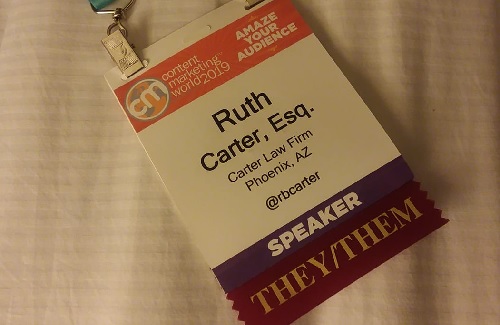I am non-binary, meaning I’m not a man or a woman. When people used to ask me what my pronouns are, I used to say I don’t care as long as you’re being respectful. I was fine with “he,” “she,” or “they.”
Now I realize that I didn’t care as long as you knew that I’m non-binary. It’s important to me that people know that I’m not a cisgender female, which is what most strangers assume I am. Being misgendered is one of the things I despise. Because of this, and to raise awareness that non-binary people exist, I decided that my pronouns are they/them.
(In case you didn’t know, cisgender person is someone who is the gender they were assigned at birth. The prefix “cis-” means “same.” The prefix “trans-” means “opposite.”)

It’s OK If You Make Mistakes
Changing how you refer to me may be an adjustment. It’s ok if you make mistakes and occasionally trip over your pronouns. (I occasionally do this with others’ pronouns.) Just correct yourself and move on. And if you hear someone refer to me as she/her, please correct them.
I expect most people are going to make mistakes most of the time. I have a friend who is the parent of a non-binary child who uses they/them pronouns. She still makes mistakes, and she’s had years of practice.
It’s “They Are,” Not “They Is”
A friend asked about how the grammar works when using “they” to refer to a single person. In English class, we were taught to say, “he/she is” for an individuals and “they are” for two more people. My colleague asked if she should say “they is” or “they are” when talking about me, and it’s still “they are.” When you use “they” to talk about an individual, it’s the same as if you were speaking about a person of unknown gender:
- When are they coming over?
- Someone lost their keys.
- Who put pants on the naked statue? High five for them!
According to Merriam-Webster, “they” has been used as a singular pronoun since the 1300s. It’s become more commonly used with increased awareness of non-binary and intersex people. (“Intersex” is the term used for people who used to be called hermaphrodites.)

Telling the Office
Until now, all my email signatures said, “Pronouns: He/She/They.” I updated those to say “Pronouns: They/Them” as well as my LinkedIn profile. The next step was to inform my officemates. I sent out a note to everyone in the building, letting them know about my pronouns. No one cares that I’m non-binary and pansexual, so I knew this would be a non-issue as well. I did get a few unexpected responses:
- One person asked what “cisgender” meant and asked about the proper phrasing when referring potential clients to me – changing from “I think she can help you,” to “I think they can help you.”
- Another officemate suggested that I consider using a non-binary nickname since Ruth is such a feminine name. I’m already established as Ruth Carter, and I don’t want a different name. If Dana, Kelly, and Ashley can be gender neutral names, so can Ruth. There’s at least one instance in literature where Ruth is the name of a male character.
- Someone asked why I don’t use “he/she” since “he” and “she” refer to an individual. I responded, “Because I’m not a man or a woman.”
Questions are Welcome
If you have any questions about my experience as a non-binary person or non-binary people in general, I’ll do my best to answer them. I won’t be upset if you inadvertently say something incorrectly.

